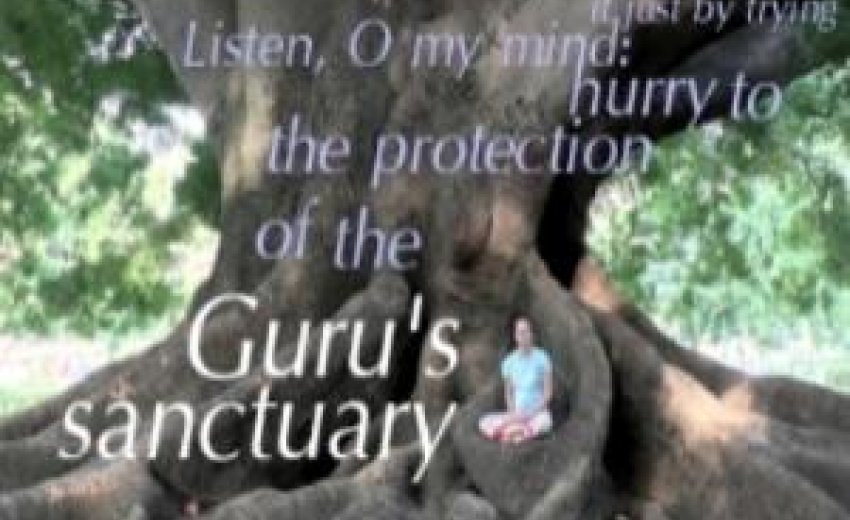Sikhi as Self-Help: Finding Our Sanctuary
Self-improvement is a lucrative business these days and entrepreneurs worldwide have cashed in on our desire to be ‘better’ people by...well, selling us stuff of course. If you’ve got a problem, then you can guarantee there’s a product for it. You smoke? Stick on these expensive patches! Obese? Drink this herbal tea with fat-burning properties! Angry? Squeeze this stress ball! In fact we’re advised to do every other thing than simply stop the damn thing that’s been troubling us. On top of this, we are also sent the message that since we are complex, evolved creatures our problems are similarly complicated. Gone are the days we could "tell it like it is" and the diagnosis was simply lust, anger, greed, pride or false attachment. Now it’s because we possess a ‘fat gene’ we can never override, a ‘childhood trauma’ or an ‘addictive personality type’ and the treatment often involves a long process of digging up deep, entrenched emotional wounds.
As Sikhs, we hold the responsibility of remaining vigilant and honest with ourselves as we attempt to quash the five vices with the purity of the five virtues. But in a day and age when modern life has multiplied our 5 vices into 500, how should we go about our own self-development? Does the spiritual prescription given by our Guru still apply, or is life just too complex to rely on such a simplistic approach?
Reflecting on this recently, I concluded that the view of a ‘vice’ being too complicated, deeply ingrained and longstanding is exactly the kind of illusion that Maya is selling. If we picture Maya as a market, then at some point in our life we end up being sold something illusory, a vice that is packaged in such a way as to look beneficial or, at very least, like an effective coping strategy. Soon however it becomes clear that this vice is having a detrimental effect on our life and we want to get rid of it, so we take another trip back to the market to see what we can buy to take it away. This time we find thousands of new "self-help" products promising to eradicate our problem. Bewildered by the sheer amount of choice we end up picking a selection of biggest, brightest and fastest vice-busters. Armed with these, whether they’re physical remedies or books offering a new way of out-thinking your vice and tricking it into submission, it’s difficult to see how they can fail. But they do. The reason for this is not because we are beyond help or that our problems are too complicated and clever for even the most advanced, cutting-edge therapies out there, but that we are making two fundamental mistakes.
We make the first mistake when we believe we own our problem in the first place. If you are addicted to caffeine, of course you show all the signs of having that problem- the 5 cups of coffee you drink every hour and the headaches you experience during a period of withdrawal- but you don’t own that problem, you’re just the one doing the problem. And doing the problem is hard work; you have an awful lot of things to do to maintain your vice. If you smoke, you have to buy cigarettes, always have a lighter on you, you always have to spend your money, waste your time…but if you’re not going to smoke, all you have to do is not smoke. [If you want to see a funny satire on this, see the video below!]
In believing that we own a problem we become entangled in false attachment, which gives way to a second mistake: we see the problem as giving us some form of identity. We start reading self-help books for others ‘like us’ or going to help groups with similarly afflicted people where conversations revolve around that problem. And sometimes it might be as simple as spending time thinking of the kinds of people who do have our problem and wishing we were one of the kind that didn’t. As a Hare Krishna monk said to me recently, in focussing all our energy on our vices or the guilt they trigger make them bigger. If we invested the same vast amounts of energy into simran and seva then we would be focussing on the solution, our virtues becoming stronger and more automatic as a result.

So, if our problems are only ‘complicated’ because Maya makes them so, how do we go about implementing the wisdom given to us by our Guru? I believe the key lies in our mindset. When our mind begins wandering off, we need to firmly bring it back to a place of sanctuary. Just like a sanctuary in the physical world, it provides a safe space in which to sit and gather our energy; a place whose warmth and comfort reminds us of the falsehood from which we have just retreated. This sanctuary is a meditative state of mind in which we sit quietly with God and in the energy and aura of the Guru. Surrounded by such company, how can we fail to find solace and contentment? It is here we find the remedies we crave; a place where truth, compassion, contentment, humility and love are all there for us to contemplate and nurture in our own souls. All the knowledge we need to live up to our highest truth and the strength to do so resides here, all we have to do is stay connected and let all our interactions spring from this place.
